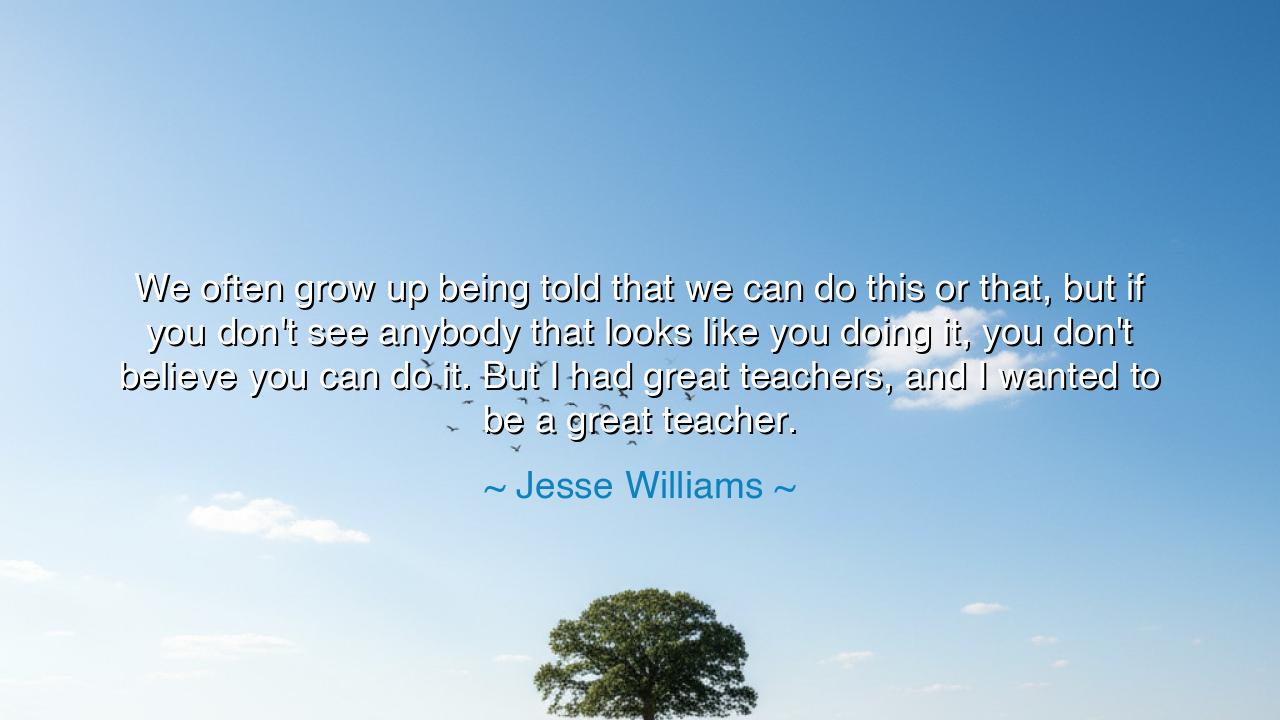
We often grow up being told that we can do this or that, but if
We often grow up being told that we can do this or that, but if you don't see anybody that looks like you doing it, you don't believe you can do it. But I had great teachers, and I wanted to be a great teacher.






Jesse Williams, both teacher and actor, once declared: “We often grow up being told that we can do this or that, but if you don’t see anybody that looks like you doing it, you don’t believe you can do it. But I had great teachers, and I wanted to be a great teacher.” In these words lies the mystery of human aspiration, the silent weight of example, and the sacred fire of mentorship. They reveal a truth older than empires: that the eyes believe more readily than the ears, and that seeing another walk the path gives courage to take the first step.
The origin of this quote flows from Williams’s own life. Before the bright lights of Grey’s Anatomy and the acclaim of acting, he walked the humbler road of an educator. He knew the struggle of a child searching for reflections of himself in a world where certain doors seemed barred by history and prejudice. His teachers did more than instruct him in letters and numbers; they embodied possibility. They stood before him as proof that greatness was not a distant myth but a living reality. And from their fire, he kindled his own.
This lesson is not his alone, but echoes throughout history. Consider Frederick Douglass, born in chains, denied the right even to hold a book. He was told he could not learn, could not rise, could not stand as a man among men. But when he saw those who defied expectation, when he grasped even scraps of literacy, he believed he, too, could ascend. Douglass later became a teacher to a whole nation, his very life a mirror in which the oppressed could see themselves anew. Like Williams, his triumph proves that the absence of example can chain the spirit, but the presence of it can set whole generations free.
The power of teachers is written into this truth. For they are not only bearers of knowledge but sculptors of courage. A teacher who believes in a child gives that child the eyes to see beyond what the world denies him. Williams’s teachers stood as lighthouses, guiding him through the storms of doubt, showing him that he could claim a destiny greater than the one written for him. And in return, he sought not riches, nor fame, but to bear that torch forward—to be a great teacher himself.
What then is the lesson for us? It is this: words alone are not enough. You may tell the child he can soar, but if he never beholds wings, he will not believe flight is for him. Therefore, be the example you wish others to follow. Live in such a way that your life itself becomes an argument against despair. Where there is silence, speak. Where there is absence, stand. Where there is doubt, embody hope. In doing so, you give others the vision their souls hunger for.
Practically, let each of us seek opportunities to mentor and uplift. If you have walked a path that others fear to tread, show them your footprints. Volunteer in schools, share your story, or simply live openly with integrity and courage. For even a single example may awaken a generation. Remember always: the young do not need perfection—they need proof that it can be done.
Thus, Jesse Williams’s words ring as both confession and command. He was blessed by teachers who ignited his heart, and he answered by becoming the same for others. Let this be your calling too: to recognize that in your actions lie the seeds of belief for those who watch you. Be the living mirror in which others may see their own possibility. For in doing so, you not only change lives—you change the very course of history.






AAdministratorAdministrator
Welcome, honored guests. Please leave a comment, we will respond soon